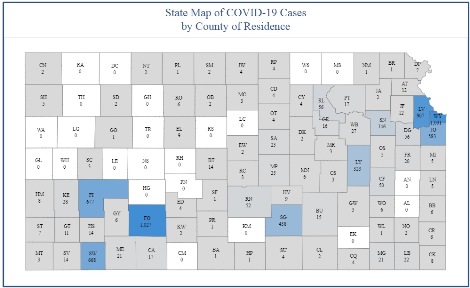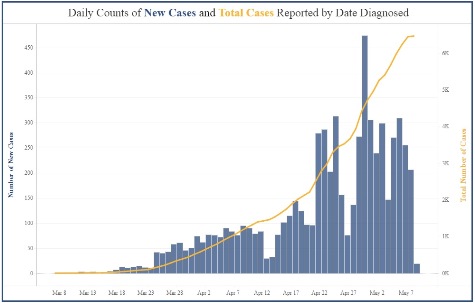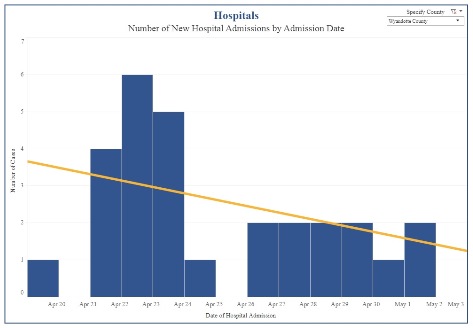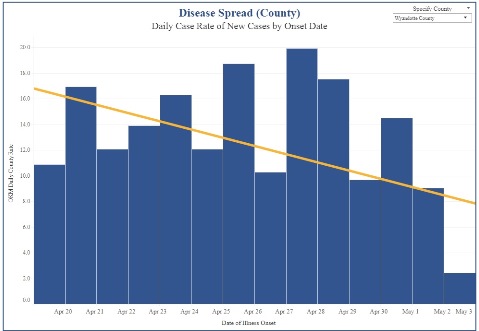



With national unemployment rates at highs not seen since the Great Depression, Gov. Laura Kelly today urged Kansans who have lost their jobs because of the COVID-19 pandemic to file for unemployment.
The worst monthly jobs report since the Great Depression showed 20.5 million jobs lost in April, with a 14.5 percent unemployment rate nationally.
“In the two short months since the coronavirus turned our lives upside down, it’s not only become the leading cause of death in the United States, it has wiped out an entire decade of job growth,” Gov. Kelly said.
A federal unemployment compensation plan provides an additional $600 per week to those who have lost their jobs in the pandemic, she said. The Kansas Department of Labor has paid out over 200,000 of the $600 payments, she said. They began processing on May 6.
Gov. Kelly urged Kansans who are unemployed because of the pandemic, are qualified and have not yet applied, to apply at www.getkansasbenefits.gov/ on certain days: A through G on Sunday, H through M on Monday, N through S on Tuesday and T through Z on Wednesday.
Gov. Kelly also announced an $8.9 million federal grant has been received by Kansas to be used to strengthen early childhood education programs. Funds will be used to keep up the current early childhood educational system, for children from birth to age 5, she said. The pandemic has caused an unprecedented amount of stress in children’s lives, she said.
Dr. Lee Norman, Kansas secretary of health, said Kansas today reported 6,501 COVID-19 cases, an increase of 357 since Thursday, and 152 deaths, an increase of five since Thursday.
Dr. Norman said the state is monitoring 76 clusters of cases, including 31 private companies, 378 cases with four deaths; 22 long-term care facilities with 540 cases and 85 deaths; eight churches with 111 cases and eight; six meatpacking plants with 1,082 cases and two deaths; three group living situations with 41 cases and zero deaths; three correctional facilities with 687 cases and two deaths; and three health care facilities with 22 cases and zero deaths.
Dr. Norman said testing of inmates at Lansing Correctional Facility is now complete, and it appears less than 50 percent have tested positive for COVID-19.
With adequate testing across the state, persons who have symptoms should reach out to their health care providers to get tested, Dr. Norman said.
Dr. Norman said the Batelle device is now at Forbes base in Topeka for reprocessing N95 masks. It is free and open to Kansas health care persons who wear masks as part of their health care work, he said. Hospitals, long-term care facilities, first responders and state agencies may use the reprocessing service. They would go through the county emergency management agency for information.
He said he hoped 10,000 masks a day could be processed.
Dr. Norman also said KDHE and University of Kansas School of Engineering have joined forces to see if COVID-19 can be detected in wastewater. They used a system that had been tested in Massachusetts and the Netherlands.
They took samples from wastewater from small and large cities in Kansas, including Lawrence and Topeka, and detected genetic material in wastewater, matching it with genetic markers for COVID-19. The virus itself does not survive in wastewater and is not a means of transmission, he said.
The testing can be used to see how widespread COVID-19 is in a community, Dr. Norman said.
Disinfection by all Kansas public water suppliers inactivates the virus and drinking water will remain safe for consumption, according to state officials.
State case counts in counties
Wyandotte County reported 1,000 positive COVID-19 cases on Friday, an increase from Thursday. In Wyandotte County, there have been more than 4,300 tests, many at outbreak sites, with a 26 percent testing rate per thousand, according to KDHE.
On Friday, according to the KDHE, Leavenworth County reported a total of 907 confirmed and probable cases, an increase of 20 cases. In Leavenworth County, more than 3,500 persons were tested after an outbreak at the state prison with a testing rate of 42.9 per thousand.
Johnson County reported 583 confirmed and probable cases, an increase of 23, according to the KDHE. There were more than 8,500 persons tested in Johnson County, with a testing rate of 14.2 per thousand.
Eighty-two counties reported confirmed and probable positive cases on Friday, according to KDHE, and some of them included: Ford County (Dodge City area), 1,027; Seward County (Liberal area), 668; Finney County (Garden City area), 677; Sedgwick County (Wichita area), 438; Lyon County (Emporia area), 323; and Shawnee County (Topeka area), 146.
More than 2,600 persons were tested in Ford County, where there are meatpacking plant outbreaks, with a testing rate of 79 per thousand.
In Shawnee County, more than 3,600 persons have been tested, with a testing rate of 20.8 per thousand.
Douglas County (Lawrence area) reported 56 cases, and Riley County (Manhattan area) reported 56 cases, according to the KDHE.
To view the governor’s news conference, visit https://www.facebook.com/GovLauraKelly/videos/728967931256339/?v=728967931256339.
The ReStart WyCo plan is at https://www.wycokck.org/WycoKCK/media/Health-Department/Documents/Communicable%20Disease/COVID19/RestartWYCOGuidanceDocument043020.pdf.
Several Wyandotte County pop-up testing sites are listed at https://wyandotte-county-covid-19-hub-unifiedgov.hub.arcgis.com/pages/what-to-do-if-you-think-you-have-covid-19.
To view the Thursday night UG Commission special session, visit https://www.youtube.com/watch?v=BHutbMMTFN8.
The UG’s COVID-19 webpage is at https://alpha.wycokck.org/Coronavirus-COVID-19-Information.
The Kansas COVID-19 website is at https://covid.ks.gov/.
The Kansas COVID-19 resource page is at https://govstatus.egov.com/coronavirus
Information from the CDC is at https://www.cdc.gov/coronavirus/2019-nCoV/.
